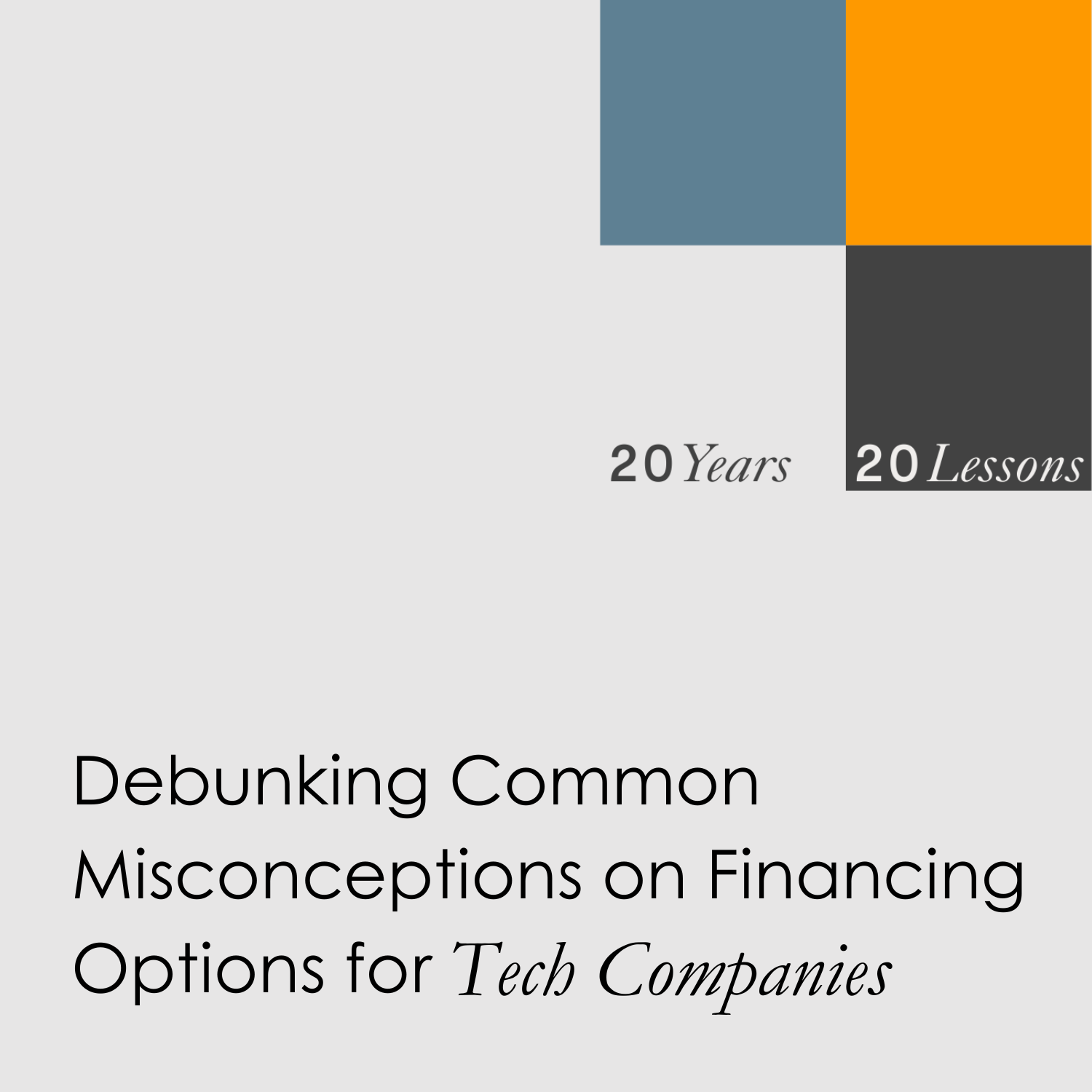For tech companies, choices of financing can have a significant impact on a company’s ability to grow and expand. Especially for growth-stage tech companies, the search for innovative solutions, the role they place and when to use financing becomes paramount for success. Contrary to the traditional view that debt serves as a temporary band-aid, many tech companies are leveraging debt as a strategic tool for long-term growth. By shifting this perspective, companies can view debt as a catalyst for facilitating scalable growth and sustainable progress.
Let’s debunk some common myths about tech company financing:
Misconception 1: Debt Capital is a Funding Tool of Last Resort, Meant to Elongate Runway or Raise Alternative Capital When Equity is Harder to Raise
The traditional perspective of utilizing debt solely to extend runway and raise funds during low capital cycles might limit a tech company’s growth potential. While it is true that debt can be used to extend runway and raise capital during low injection cycles, this misconception does not take into account the benefits of using debt as a tool for growth. Debt financing allows tech companies to access additional capital without any or minimal dilution of their ownership stakes or giving up control over their business. Explore innovative approaches to debt financing as a strategic growth tool during pivotal moments such as research and development (R&D) and scaling, effectively challenging the notion that debt is only a short-term fix.
Misconception 2: Debt Financing as a Cushion against Unforeseen Expenses
Debt financing does not only serve as a safety net for unexpected expenses but also when companies get to positive unit economics they can accelerate growth with debt financing. Debt financing can play an important strategic role in advancing a tech company’s growth objectives, especially during periods of growth. Tech companies can strategically leverage financing to drive their growth initiatives and capitalize on market opportunities. By shifting the narrative from viewing financing as a reactive measure to one that strategically fuels growth initiatives, tech companies can not only navigate forced growth phases more effectively but also position themselves to capitalize on future opportunities with confidence and agility.
Misconception 3: All Venture Debt is the Same, When in Fact, There Are Many Different Structures to Credit
High growth start-ups, in pursuit of scaling, may not focus on the distinction between corporate debt and asset-based loans, often conflating the two or failing to recognize their unique benefits. Understanding the nuances of each financing option is critical for tech enterprises to optimize their financial strategies in alignment with their growth objectives. Corporate debt is a type of financing that allows companies to borrow money from lenders in exchange for interest payments over time. Asset-based loans, on the other hand, are secured by specific assets such as inventory or accounts receivable. This form of financing is typically used by companies that have a high level of working capital and need to borrow money against their assets in order to fund growth. While both types of financing can be beneficial for tech enterprises, they each have their own unique benefits and considerations. The most important thing to remember is that both types of financing are available to tech companies. The key is to understand the differences between them and choose the one that best fits your business needs.
Misconception 4: A Loan is a Loan, It Doesn’t Matter Who You Get It From
Tech companies often view their relationship with debt providers as transactional, and overlook the benefits of cultivating partnership-oriented relationships. This can prevent tech firms from realizing the full potential of their financing options, inhibiting their ability to achieve strategic growth. As a flexible partner, PFG advocates for a collaborative approach to financing that supports a tech company’s long-term vision. This approach enables companies to access customized financing structures that align with their unique growth objectives. By dispelling the purely transactional approach to borrowing and embracing the importance of partnership with lenders, tech companies can access greater strategic flexibility and align with long-term goals.
__
As growth-stage companies navigate the complexities of financing markets, they rely on trusted and innovative partners like Partners for Growth (PFG) to provide tailored financial solutions that empower them to achieve their growth objectives and capitalize on market opportunities. By partnering with PFG, tech companies gain access to 20 years of world-class expertise in private credit markets and forward-looking financial offerings. Embracing all financing relationships, both equity and debt, helps companies navigate growth challenges and pursue their long-term vision as aligned strategic partners.
If you have any further questions, you can get in touch with us here.






